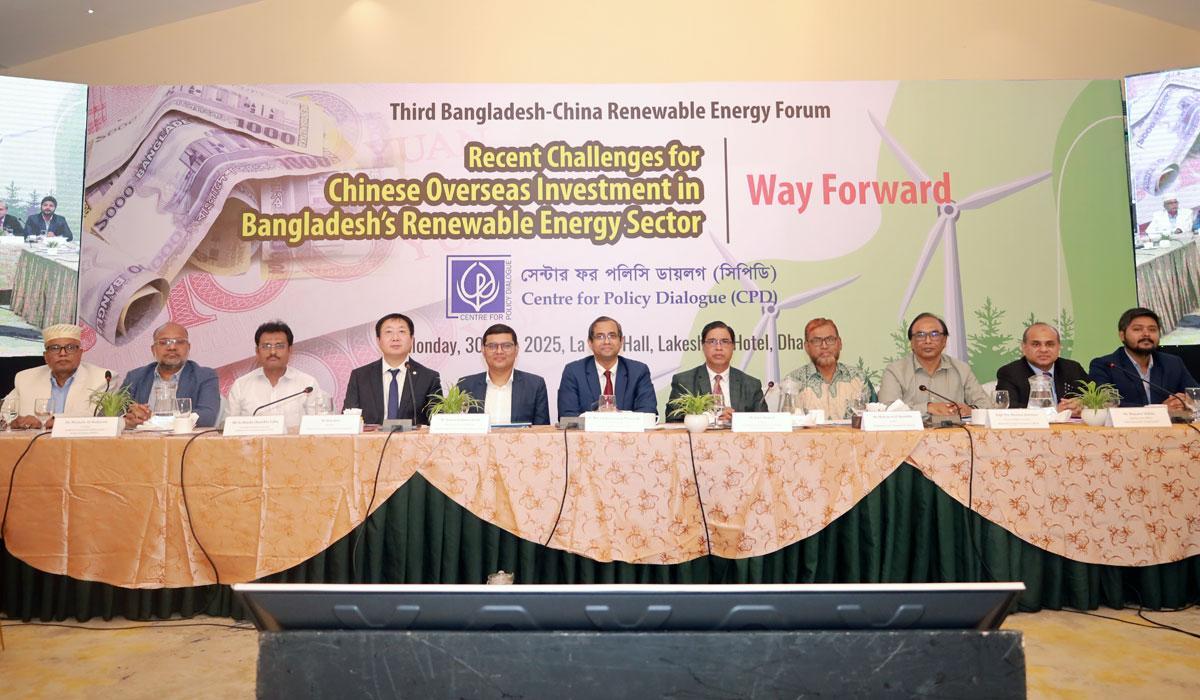The Centre for Policy Dialogue (CPD) has warned that Bangladesh risks losing $6 billion in clean energy investment unless the country urgently brings about much-needed institutional and regulatory reforms of the energy sector.
The leading local private think-tank made these remarks during the third Bangladesh-China Renewable Energy Forum dialogue styled ‘Recent Challenges for Chinese Overseas Investment in Bangladesh’s Renewable Energy Sector: Way Forward’ hosted at a city hotel on Monday.
CPD research director Khandaker Golam Moazzem and Abrar Ahammed Bhuiyan jointly presented a keynote presentation, highlighting a major setback for foreign investment in Bangladesh’s renewable energy sector.
It said the government has cancelled 31 solar power projects to the tune of an estimated $6 billion, with investors already pouring in around $300 million, thus raising serious concerns over policy stability and institutional credibility.
The projects represented a total of 3,287 MW of solar power. Fifteen companies already purchased the required lands as they received green signal.
The cancellation of the projects led toward the disappointment of the investors as they already paid taxes and made financial commitments.
Out of the schemes, four were backed by Chinese investors, who have become key players in Bangladesh’s renewable energy landscape, accounting for over 50 per cent of the sector’s foreign direct investment (FDI).
China’s total investment in the country stood at $2.65 billion, representing 15.1 per cent of Bangladesh’s total FDI stock in 2024.
Han Kun, president of the Chinese Enterprises Association in Bangladesh, said: “After we made the investment and the plant became ready for commercial operation, we were abruptly informed of impending changes to the tariff structure. Altering the terms and conditions at such a late stage creates significant uncertainty and poses a serious risk to investors who have already committed substantial resources to power projects.”
Han warned the cancellation of letters of intent (LoIs) might discourage investors in the long run saying: “When investors hear that deals may be renegotiated after investments have already been made, it sends a troubling signal. Such uncertainty discourages new investors from entering Bangladesh.”
“Global experience shows that actions like these can erode long-term investor confidence, raise the cost of financing future infrastructure projects, and slow progress on the energy transition.”
A November 14 notification announced the government’s decision to stop building new power plants and processing power purchase proposals under the Quick Enhancement of Electricity and Energy Supply (Special Provision) Act 2010.
At least 11 writ petitions have been filed in the High Court challenging the halt of solar power projects awarded under the Act.
Beyond policy instability, the report identifies bureaucratic bottlenecks, poor digital infrastructure, and lack of a single-window system as major deterrents.
It calls for the full digitalization of investment procedures, establishment of a Foreign Investor Helpdesk, and consolidation of licenses under a streamlined platform.
CPD’s Research Director Khondaker Golam Moazzem said that BIDA needs to take the lead in solving these problems. BIDA can act as a coordinator to ensure all investment-related facilities.
This would save both time and money. The government must work to resolve the complications surrounding multiple licences.
Although there is talk about digitisation, in reality, only half of the process has been digitised.
The CPD also urged the government to reconsider its stance on rooftop solar, recommending flexibility in capacity limits and risk-sharing mechanisms for OPEX-based solar service providers.
Shahidur Rahman, country manager of Jinko Solar Bangladesh, noted that countries such as India, Brazil and several in Africa actively facilitate land acquisition for setting up solar power plants—an area where Bangladesh continues to face significant challenges.
The CPD recommendations come at a time when Bangladesh is under pressure to expand its renewable capacity while managing rising energy costs and subsidies in the fossil fuel-dominated grid.
Jalal Ahmed, chairman of Bangladesh Energy Regulatory Commission (BERC), attended the event as a special guest.
Nahian Rahman Rochi, head of Business Development at the Bangladesh Investment Development Authority (BIDA), and Mohammad Alauddin, rector of the Bangladesh Power Management Institute, were present as guests of honour.
Policy instability threatens $6b renewable investment

Leave a comment

